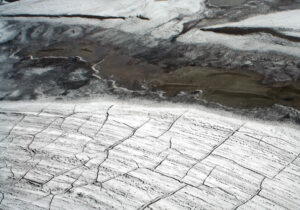Researchers have recently made a significant discovery of a virus that has been dormant for a staggering 48,500 years. Jean-Michel Claverie, an economics and bioinformatics professor at Aix-Marseille University in France, has dedicated the past decade to searching for “zombie viruses.” These latent microorganisms have the potential to infect hosts even after being frozen for hundreds or thousands of years. The virus was found preserved in the permafrost of Siberia, raising concerns about the impact of these dormant viruses on human health.
Claverie’s research specifically focuses on viruses that can infect amoebae. His team extracted thirteen viruses from Siberian permafrost samples, and all of them were capable of infecting amoebae when cultured on petri plates. Radiocarbon dating of the permafrost samples revealed that the youngest virus was 27,000 years old, while the oldest had been frozen for an astonishing 48,500 years, making it the oldest virus ever revived.

Permafrost, characterized by extremely low temperatures and the absence of oxygen and microbes, acts as a preservation technique, mummifying organic matter for thousands of years. However, with climate change causing the thawing of permafrost, there is a risk of releasing dormant viruses and other organisms into the environment. The warming Arctic could potentially lead to the reemergence of viruses that can infect humans and animals.
While there is still much to learn about these zombie viruses and their potential threats, scientists emphasize the importance of studying them proactively. However, they also caution against provoking fear, as the behavior and lifespan of thawed viruses in modern conditions remain uncertain. Additionally, viruses require a host to replicate, and the remote locations of these frozen viruses minimize immediate risks. Nevertheless, as the planet heats up and more people are drawn to the Arctic, there is a concern about the potential complications of a human contracting a zombie virus.
Specialists recommend preserving the frozen state of permafrost as much as possible, which requires efforts to mitigate climate change. Keeping the Arctic frigid is seen as a preferable approach to minimize the risks associated with thawing dormant viruses.


